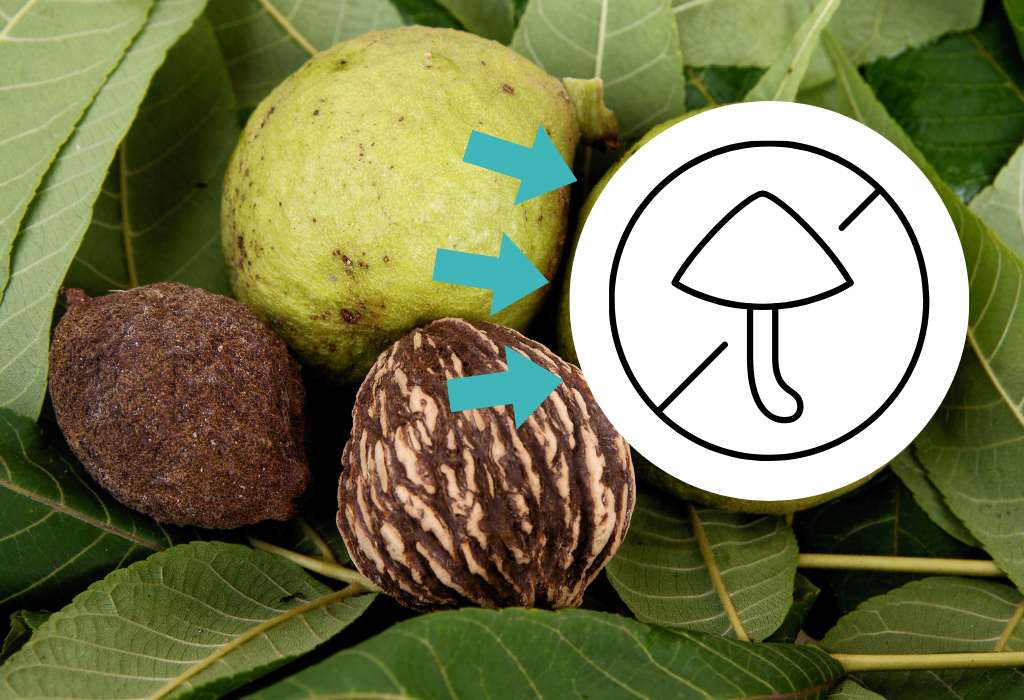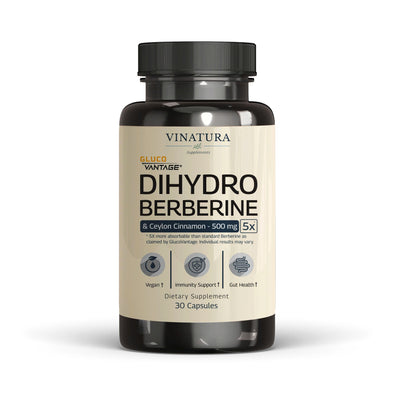
Are Black Walnuts Antifungal? Antifungal Benefits of Black Walnuts
Black Walnut is often regarded as a potential remedy for supporting the fight against fungal infections such as toenail fungus, fingernail fungus, yeast infections, and Candida.
However, while it may offer beneficial antifungal properties, it's important to understand its true effectiveness, the best ways to use it for optimal results, and how to avoid potential side effects. This article will explore everything you need to know about Black walnuts.
Before exploring further, please read the disclaimer located at the end of this webpage.
Key Takeaways
- The juglone compound found in black walnut leaves offers powerful antifungal properties.
- Black walnuts may help inhibit Candida strains due to their antibacterial and restorative characteristics.
- Black walnut extract is available in capsule form or as a liquid essential oil extract.
What Is Black Walnut?
Black walnut, a tree species belonging to the Juglans genus of the Juglandaceae family, is distinct from the common English walnut. It serves as a rich source of essential life-sustaining components, including protein, fats, nutrients, and minerals [1].
Notably, black walnuts contain the bioactive compound juglone, which is commonly found in the leaves, fruit, and trunk of the black walnut tree.
Are Black Walnuts Antifungal?
The answer is yes; black walnut has significant antifungal effects, all thanks to its bioactive compound juglone (5-hydroxy-1, 4-naphthoquinone).
Numerous studies have shown that this key component of black walnut exhibits strong antibacterial properties against both gram-positive and gram-negative bacteria, as well as antifungal activity against pathogenic fungi like Candida Albicans [1].
Therefore, black walnut extract truly holds potential in natural therapies to aid in reducing fungal infections.
Therefore, black walnut extract truly holds potential in natural therapies to aid in reducing fungal infections.How Do Black Walnuts Work As An Antifungal?
Based on the study above, black walnuts demonstrate antifungal effects by disrupting the metabolism, growth, and spread of fungi. Specifically, its actions include [1]:
- Antifungal Activity: Juglone, a potent compound in black walnuts, effectively combats various microorganisms, including Candida Albicans. This compound interferes with essential enzymes and metabolic pathways, weakening the fungi's ability to grow and survive.
- Support for Recovery: Juglone also aids in restoring and improving gut function, playing a critical role in managing fungal infections during treatment. Additionally, it promotes healing, enhances skin health, and improves wounds caused by fungal infections.
Antifungal Benefits of Black Walnuts

Black Walnut For Toenail Fungus
Toenail fungus is a very common condition that causes both aesthetic issues and discomfort for those affected. With its strong antifungal activity, Black Walnut can be used as a method to support the treatment of toenail fungus.
You can apply a mixture of Black Walnut extract to the affected areas to inhibit the growth of fungal hyphae, reduce inflammation, relieve itching, and restore the health of your toenails.
Black Walnut For Nail Fungus
Similar to toenail fungus, fingernail fungus can cause pain, natural swelling, and redness and make nails brittle and unsightly. To address this issue, you can use extracts from black walnut, as the Juglone compound it contains helps improve the condition of the nails and reduce the growth of the fungus.
Black Walnut For Yeast Infection
Yeast infections, especially in the vaginal area, are quite common among women. They cause discomfort, itching, burning, and unusual discharge. However, these symptoms can be improved if you use Black Walnut extract regularly, helping the body fight fungi naturally and reduce the growth of yeast infections.
Black Walnut For Candida
Candida Albicans is a type of fungus that causes infections in patients with weakened immune systems or those who have undergone radiation, chemotherapy, or surgery. A dangerous feature of this fungus is its ability to form a biofilm—a protective layer that resists treatment methods as well as the body's immune system.
According to a study, black walnuts are effective in supporting antifungal activity and combating the growth of Candida Albicans. The compound Juglone in black walnut can inhibit and disrupt biofilm formation, reducing the spread and recurrence of infections caused by this fungus [2].
How To Use Black Walnuts For Antifungal?
To use Black Walnut for antifungal purposes, users can consider the following two methods:
- Taking the extract in capsule form: This is the most common method to inhibit the growth of fungi from within the body. It is especially useful if you are dealing with yeast infections or Candida, which can cause internal infections.
- Using the liquid extract: This method is typically suitable if you have nail fungus, toenail fungus, or skin fungal infections. Applying it directly to the affected area helps significantly fight the fungus and inhibit bacterial growth.
What Are The Side Effects Of Black Walnuts?
For humans: So far, black walnut has not been reported to cause any severe side effects in users. However, if you are new to using it, you may experience conditions such as headaches or fatigue.
Additionally, using the leaves or bark of black walnuts directly may cause allergic reactions such as skin irritation or digestive discomfort.
For plants: Black walnut has been noted to harm the growth of certain plant species due to the compound Juglone, which can inhibit the respiration process of sensitive plants.
A large amount of Juglone in the roots of black walnut trees can suppress the growth of surrounding plants, and this inhibition can last for many years, even after the tree has been removed [3].
For animals: Research has shown that animals, especially dogs, may suffer from poisoning and digestive disorders if they ingest parts of the black walnut tree, particularly the bark and nuts.
Who Should Not Take Black Walnut Supplements?

People with liver or kidney diseases should avoid using black walnut supplements, as they may irritate. Additionally, individuals with digestive issues should consult a healthcare professional before using black walnuts.
Precautions And Interactions of Black Walnut Supplements
Note: Pregnant or breastfeeding women should consult a doctor before using products containing Black Walnut extract. It is especially recommended to follow the dosage guidelines provided by a doctor or the manufacturer to ensure proper absorption and avoid any harmful side effects.
Drug interactions: Black Walnut may interact with certain medications, such as blood thinners and blood pressure medications. It is important to be cautious when using these drugs alongside Black Walnut.
Can Black Walnuts Be Toxic?
The answer is yes; Juglone (a type of naphthoquinone)—the main compound in black walnut—can cause toxicity if used in excessive amounts or improperly. Therefore, it is important to choose products or parts of black walnuts that have been properly processed.
Minimize the use of raw black walnut leaves or husks without guidance from a healthcare professional.
Conclusion
With the information provided above about Black Walnut and its antifungal benefits, you now have a comprehensive understanding of its remarkable properties. You can begin by assessing your body's condition to choose the most suitable method of use, thereby optimizing the potential benefits that Black Walnut offers.
References
- [1] Mozhaiev, I. (2023). Actual aspects of medical use of woloski nut extracts (Juglans regia l.) and black walnut (Juglans nigra l.). Annals of Mechnikov's Institute, (4), 12-18. https://journals.uran.ua/ami/article/view/291562
- [2] Grover, B. S., & Chhabra, A. N. I. T. A. (2016). Effect of Juglone on Candida albicans growth and biofilm formation. J Mycopathol Res., 54(3), 6-391. https://www.imskolkata.org/pdf/oct_16/11.%20bhavna%20sharma.pdf
Author

Product Disclaimer
Including an ingredient or study does not evaluate, endorse, or recommend any Vinatura product or any third-party product. Some ingredients discussed may not be used in any Vinatura product.
The content of the articles has not been evaluated by the Food and Drug Administration (FDA) and is not intended to promote or endorse any specific product. Any products sold on this website are not intended to diagnose, treat, cure, or prevent any disease.
Opinions and Endorsements
Any claims, statements, or opinions expressed in the articles are those of the author(s) and do not necessarily reflect the views or opinions of the manufacturers of the dietary supplement products. The products sold on this website are separate from the content of the articles and are not directly endorsed or associated with the information presented here.
Liability Disclaimer
The author(s) of the articles, website, and manufacturers of the dietary supplement products do not assume any liability for any potential consequences arising from the use of the information provided in the articles. Ingredient effects, dosages, and safety vary by individual, formulation, and context; some ingredients interact with medications or may be unsuitable during pregnancy or lactation. It is recommended that individuals consult with a qualified healthcare professional before making any dietary or lifestyle changes, including the use of dietary supplements.
Product Usage
Please refer to the product labels and packaging for specific usage instructions and guidelines for the dietary supplement products sold on this website.
Customer Support
For any concerns or questions regarding the dietary supplement products, please contact our customer support team, who will be more than happy to assist you.






Leave a Comment
Be the first to comment.
What do you think?